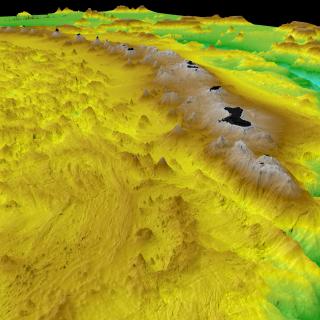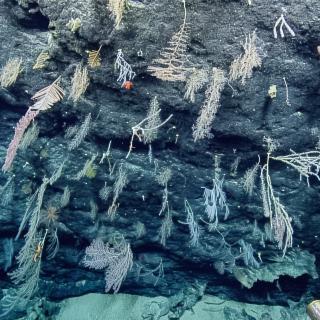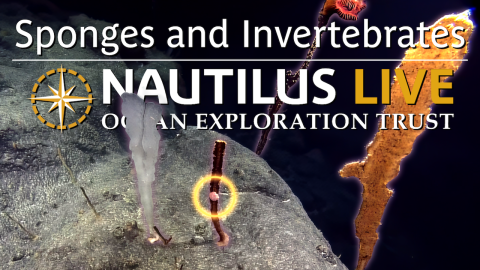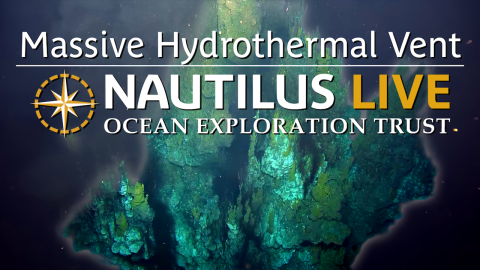11 Educators, Students, Scientists from Marianas Joining E/V Nautilus This Year

Local explorers from Guam and the Commonwealth of the Northern Mariana Islands will join expeditions exploring the deep sea of the Mariana Archipelago and bring the experience home to the community
In May and June* 2025, Ocean Exploration Trust (OET) and its partners will explore deep-sea habitats of the Mariana Archipelago using E/V Nautilus, its mapping sonars, ROV systems, and other exploration technologies from the NOAA Ocean Exploration Cooperative Institute. Eleven local educators, students, and scientists from Guam and the Commonwealth of the Northern Mariana Islands will be key parts of the expedition team!
Four Mariana educators were selected for OET’s Science Communication Fellowship. Shelterihna Alokoa from Pacific Islands University in Mangilao, Shannon Seleen from the Guam Department of Education in Yigo, and Kyle Menter from San Vicente Elementary School on Saipan will sail as expedition storytellers with freelance science communicator Amanda Dedicatoria from Mangilao returning to the ship as a mentor for new educators after sailing onboard E/V Nautilus last year. These formal and informal educators will engage students and the public in the wonders of ocean exploration while sharing discoveries from the 2025 mission, and later bring home the deep sea by incorporating their experience into classroom lesson plans, community presentations, and educational opportunities.
Additionally, three local students will sail as part of OET’s Science and Engineering Internship Program. Mya Satomi Ngemaes, a senior from Palau studying Integrative Biology at the University of Guam, was selected as an Ocean Science Intern, while Amber Josfin Pineda, a University of Guam Civil Engineering department first-year student from Dededo, will sail as an ROV Engineering Intern. John F Kennedy High School alum and Columbia University student Levis Bawit will also sail as an ROV Engineering Intern. These at-sea internships embed students in the expedition team, providing real-world experiences to further develop their academic and professional career paths. Other local participants include University of Guam student Ale’a Duenas sailing as a permit resource monitor, scientists Erica Jonette Leon Guerrero of Saipan, Kelsey McClellan from Northern Marianas College, and Mariana Trench Marine National Monument Superintendent Sean Macduff.
These explorers will join one of two deep-ocean exploration expeditions using innovative technologies to explore never-before-seen and poorly understood places in the diverse deep-sea habitats of the Mariana Islands. This region is largely shaped by the forces of plate tectonics, with some of the oldest seafloor on the planet being driven into the Mariana Trench (the deepest ocean trench) and then remelted to bubble up as magma, forming a chain of volcanic islands and subsea volcanoes. Exploring underwater volcanoes, deep abyssal plains, mud volcanoes, and the water column above the trench, these expeditions will provide open data for local resource managers and inform resource management priorities.
The community across the Marianas is warmly invited to explore the deep sea with this team, May 7 - June 28. Audiences worldwide can engage with these local explorers via NautilusLive.org, a 24-hour live-streaming web portal bringing ship and undersea camera footage from the field to learners on shore via telepresence technology and social media. Corps of Exploration members will participate in live broadcast ROV dive question-and-answer sessions through the Nautilus Live website while aboard the ship. Schools and community groups can also schedule free, live one-on-one Q&A sessions with explorers on the ship beginning in May.
*Update: Ongoing mechanical repair of a ship system has changed operational plans for the NA172 expedition, postponing the water column exploration and remotely operated vehicles portion of this expedition within the Mariana Trench Marine National Monument. The selected name Metaw will be reserved for a future expedition.

Mattingan: Mariana Arc Volcanic Exploration
E/V Nautilus will begin the 2025 season exploring the ocean of the Mariana Islands- one of the most tectonically and volcanically dynamic locations on the planet. This area is home to one of the most active arc volcanic systems on Earth with more than 60 submarine volcanoes, and a back-arc spreading center where new seafloor is created.

Exploring the Offshore Marianas
Update: Ongoing mechanical repair of a ship system has changed operational plans for the NA172 expedition, postponing the water column exploration and remotely operated vehicles portion of this expedition within the Mariana Trench Marine National Monument.



